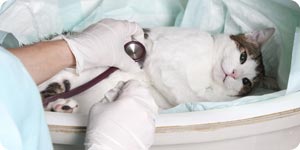
Feline Inflammatory Bowel Disease is one of the most common gastrointestinal diseases in cats. The term actually refers to a group of disorders that cause inflammation of the stomach lining or intestinal tracts, which causes changes in the normal bodily functions these organs perform.
Symptoms
Symptoms of Feline Inflammatory Bowel Disease often mimic those of other diseases or illnesses, therefore it is important to take your cat to see the veterinarian if any of these symptoms occur. They include:
- Chronic vomiting or diarrhea
- Loss of appetite
- Weight loss
- Refusal to use the litter box
- Stomach gurgles or rumbling
- Flatulence
- Darkened stools
- Abdominal pain
These symptoms can last over the course of several weeks, or can come and go intermittently.
Diagnosis
Your veterinarian will have to conduct several tests to rule out other medical conditions, because of the common symptoms. You can expect tests such as:
- X-rays
- Stool assessment
- Blood tests
- Ultrasound tests
Once other conditions have been ruled out, a biopsy will be conducted to check the lining of the stomach and intestinal organs. It is at this stage that a positive diagnosis for Inflammatory Bowel Disease will be made.
The biopsy itself is best done using fiberoptic technology, allowing a small scope to be inserted through the cat’s stomach or colon. This type of procedure is less invasive than a traditional biopsy, and can be done under general anesthesia. Your cat will usually be able to return home the same day the procedure is performed.
Treatment
While Inflammatory Bowel Disease might never be completely cured, the disease does not have to be fatal and can be managed with a combination of medication and diet restrictions.
- Prednisone may be prescribed to reduce the swelling and irritation of the inflamed tissues.
- Other medications should be used in combination with the prednisone to relieve vomiting and diarrhea, and antibiotics are often prescribed to prevent further infection of other organs.
- Drug therapy usually lasts for about three months, at which point the medications will be decreased over time in an attempt to avoid long-term side effects.
- Your cat’s diet may be restricted or changed as a result of the diagnosis. Hypoallergenic foods or natural organic food is recommended, as these are easier to digest and won’t cause further irritation of the stomach or intestines.
- The dietary changes will help to ensure that the effects of the medications are lasting, reducing the need for drugs. Eventually, your cat may be able to wean off of the drugs completely, depending on the severity of the disease and the damage it has caused.
If your cat is showing any symptoms of Feline Inflammatory Bowel Disease, take her to see the veterinarian as soon as possible. Early detection and treatment improve the effects of the treatment a great deal, and minimize the amount of damage done to your cat’s internal organs.
